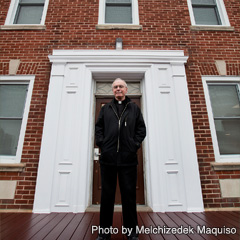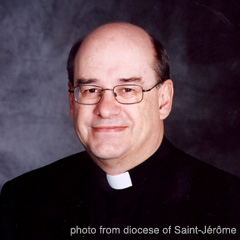 Fr. Harry J. Gensler is a Golden Rule junkie.
Fr. Harry J. Gensler is a Golden Rule junkie. In fact, the Jesuit priest and professor of philosophy at John Carroll University in Cleveland wrote both an MA thesis and PhD dissertation on the Golden Rule. He’s also published 12 books on ethics and logic — most involving the Golden Rule.
And on May 11, he’ll be sharing his knowledge on the Golden Rule in a lecture at Scarboro Missions. He’ll be discussing how to use it wisely and avoid fallacies.
For more information, call (416) 261-7135 ext. 296 or e-mail interfaith@scarboromissions.ca.
KAIROS hosts mining conference
By Catholic Register Staff Church leaders from Canada, Africa, Asia-Pacific and Latin America will gather in Toronto for an ecumenical conference on mining from May 1-3.
Church leaders from Canada, Africa, Asia-Pacific and Latin America will gather in Toronto for an ecumenical conference on mining from May 1-3. Hosted by KAIROS and several of its member institutions in partnership with Norwegian Church Aid, they will be joined by indigenous partners, social partners from the Global South, Church members and agency staff.
The gathering is meant to develop alliances between leaders from the North and South in an effort to achieve mining justice around the world.
Faith-based framework will deal with sexual-orientation bullying
By Sheila Dabu Nonato, The Catholic RegisterTORONTO - Ontario’s bishops and school trustees are encouraging Catholic high schools to enhance existing anti-bullying policies by establishing support groups for students being bullied due to sexual orientation.
Under the direction of the bishops and the Ontario Catholic School Trustees’ Association, a committee will be formed to draft a framework for how such groups would operate within the teachings of the Church. The committee, to include a bishop, students, parents, trustees, clergy and other educators, will work with the Institute for Catholic Education to have a policy prepared by September.
In a memorandum addressed to Catholic educators, the bishops and trustees acknowledged that recently there has been “much discussion” about this issue. That public discussion, which included news reports about Catholic school boards opposing so-called gay-straight alliance clubs, led to a decision to enhance the broad anti-bullying protocols that have been in place for almost a decade. The expanded framework to deal with bullying due to sexual orientation will be available to any Ontario Catholic board that wishes to implement it.
Nancy Kirby, president of the Ontario Catholic School Trustees’ Association, emphasized that the proposed groups are not gay-straight alliances (GSA), which are prominent across North America. GSAs deal with lifestyle issues. The enhanced Catholic framework, which builds on existing anti-bullying protocols, will deal exclusively with the issue of bullying and complement the existing teaching that “bullying is wrong under any circumstances, at any age.”
“After speaking to our students, the supports that we do have in place, some students who are of same-sex orientation feel they are not adequate for the support they require,” Kirby said.
“Compassion, care and service to the most vulnerable in our communities are vital and important tenets of our Catholic faith,” said the April 15 memo prepared by the bishops and trustees. “We are not aware of an increase in harassment of this type, but any type of bullying or harassment in Catholic schools will not be tolerated.”
A committee, to be chaired by an Ontario bishop, will convene this month to develop a province-wide policy for Catholic schools. Kirby said topics on dating, marriage and relationships could be discussed in the support groups but “everything would be based on our faith, with that perspective in mind.”
The new framework is “requesting (all) boards to implement this when it comes forward,” Kirby said, but it will not be mandatory for schools.
Although the committee will be convened to examine one specific type of bullying, its work will be based on existing policies that strive to ensure all students are educated in a safe and caring environment that does not tolerate any type of bullying or harassment. To that end, in addition to addressing bullying due to sexual orientation, the committee will “collect and share the best resources and practices” from across the province to combat all forms of bullying so as to ensure that Catholic schools “are places of welcome according to the Gospel.”
Belleville parish grows where others decline
By Therese Greenwood, Catholic Register Special BELLEVILLE, Ont. - At a time when many Canadian parishes are facing shrinking resources, St. Michael the Archangel in Belleville has opened a new parish centre that is quickly becoming a busy pastoral and social hub for a lively and engaged congregation.
BELLEVILLE, Ont. - At a time when many Canadian parishes are facing shrinking resources, St. Michael the Archangel in Belleville has opened a new parish centre that is quickly becoming a busy pastoral and social hub for a lively and engaged congregation. “Belleville has a reputation as a strong Roman Catholic community although we are only about 20 per cent of the city’s total population,” said Fr. Richard Whalen, pastor of St. Michael’s.
Certainly the opening of a new parish centre speaks to the vibrant spiritual life of Belleville. This southeastern Ontario city already had busy church halls at the parishes of Queen of the Most Holy Rosary and St. Joseph and, when available, schools also offered space to assist St. Michael’s. But demand kept growing in the downtown parish, the oldest in Belleville.
“St. Michael’s is in one of the more established neighbourhoods of the city. It has strong Irish Catholic and French Canadian roots,” said Whalen of the parish founded in 1829. “That included many rural residents who have now moved into town and retained that strong tradition.
Home front is battlefield for religious persecution fight
By Deborah Gyapong, Canadian Catholic News OTTAWA - Prime Minister Stephen Harper’s promise to fight religious persecution abroad has won applause from religious freedom advocates, but some would like to see more attention paid to religious freedom on the home front.
OTTAWA - Prime Minister Stephen Harper’s promise to fight religious persecution abroad has won applause from religious freedom advocates, but some would like to see more attention paid to religious freedom on the home front.In Mississauga April 23, Harper told a diverse crowd that included many who came to Canada after fleeing religious persecution that he would establish an Office of Religious Freedom to ensure the defence of persecuted religious minorities remained a priority of foreign policy.
“While we are thankful in a country that spares us such tests, we must not let our comfort be an excuse to shirk our commitment to the cause of freedom,” he said.
Harper praised the memory of Shahbaz Bhatti, the Roman Catholic Pakistani minister of religious minorities who was assassinated March 2 for his defence of Christians unfairly targeted by that country’s blasphemy law.
“This is very good for the religious minorities of Pakistan and around the world,” said Peter Bhatti, the founder of International Christian Voice and older brother of the slain Pakistani minister. “This office will highlight and monitor the situation of what is happening to religious minorities.”
Liberal Leader Michael Ignatieff also supports taking on religious persecution on foreign shores.
2011 Easter message by the President of the CCCB, Most Rev. Pierre Morissette
By Pierre Morissette, Bishop of Saint-Jérôme For many of us, our yearly Lenten journey has been shaped by its beginning and end. We started with the temptations of Jesus and then the vision of his transfiguration. We end by entering with him into Jerusalem, where we share with him in his suffering, death and resurrection. But what has this really meant for us, and what happened to us on the way?
For many of us, our yearly Lenten journey has been shaped by its beginning and end. We started with the temptations of Jesus and then the vision of his transfiguration. We end by entering with him into Jerusalem, where we share with him in his suffering, death and resurrection. But what has this really meant for us, and what happened to us on the way?Sometimes we forget what the journey is really about, and fail to see what should be noticed along the route. In case you may have missed it, the three intervening Sundays of Lent told us a great deal about the Lenten journey and our entry into the Easter celebration. The readings of the Third, Fourth and Fifth Sundays of Lent invited the catechumens, as candidates for Baptism, to think over and even “test” their motives about why they want to be initiated into the community of faith. The same readings also invited the rest of the Christian community to examine its own faith journey. Three major points came forward in this year’s readings: What do we most yearn and thirst for in life (the Gospel reading of the woman at the well)? How can we see what life is really about – not only to have sight, but insight and vision (the healing of the blind man at the pool of Siloe)? How can we embrace life and stand with courage, strength and inspiration among those truly alive (the Gospel reading of the resurrection of Lazarus)?
Often we simply plod along the road of faith – moving as if in some shadowy, superficial existence, not really aware. We frequently stumble on, half-hearted, hazy eyed, hesitatingly. Not fully alive, and not even aware of the deepest yearnings in our hearts, or in the hearts of our brothers and sisters.
Perhaps this is why we are easily distracted along the way. There is so much talk and chatter in contemporary life. Our daily lives are filled up with the glaring sounds of radio and television, the fleeting words of text messages and websites, and the frequently disturbing and cruel remarks from blogs and social media.
The Paschal Mystery is the road on which we are called to discover our deepest yearnings and most authentic needs. It gives us the light that enables us to see Light. It opens the way to life and to the truth about life. It is Life itself.
The 50 days of Easter are an invitation for us to rediscover the depths of our own lives. Through the Resurrection of Christ, we see the creative and transforming strength of God’s love for us and our world. This journey in faith is the journey to eternal life. To borrow from the words of Saint Paul, God our Father who raised Christ from the dead will give life to our mortal bodies also through his Spirit that is dwelling in us (Romans, 8.11).
Christ is risen! Yes, Christ is risen indeed!

+ Pierre Morissette
Bishop of Saint-Jérôme
President of the Canadian Conference of Catholic Bishops
Rights tribunal backs Knights’ pro-life message at Ontario church
By Michael Swan, The Catholic Register A pro-life message on church property can’t be construed as a violation of Ontario’s Human Rights Code, a human rights’ tribunal has ruled.
A pro-life message on church property can’t be construed as a violation of Ontario’s Human Rights Code, a human rights’ tribunal has ruled.“Freedom of religion must not be interpreted in a way that voids the positive dimension of the freedom (the right to hold beliefs, practice and disseminate them) of any meaning,” wrote Human Rights Tribunal of Ontario adjudicator Michelle Flaherty in an April 5 decision in favour of a Knights of Columbus council in l’Original, Ont.
The francophone Chevaliers de Colomb attached to the parish of Saint-Jean Baptise, an hour-and-a-half southeast of Ottawa, found itself on the defensive over a monument erected on the church’s front lawn. An inscription on the monument read (in French), “Let us pray that all life rests in the hands of God from conception until death.”
Pain of Lahey trial could spark renewal
By Deborah Gyapong, Canadian Catholic NewsOTTAWA - When Bishop Raymond Lahey goes to trial on child pornography charges May 4, the anticipated news coverage will reopen wounds caused by the worldwide clerical sexual abuse, regardless of the trial’s outcome.
But observers say the pain provides an opportunity for needed renewal.
The former bishop of Antigonish was charged with possession and distribution of child pornography in October 2009. Lahey’s arrest followed the seizure of his laptop and other electronic equipment at Ottawa’s airport by a Canadian Border Service agent.
“The first thing is that a person is presumed innocent until proven guilty and we should not jump to conclusions,” said Fr. Frank Morrisey, a canon lawyer who has advised the Canadian Church on the clerical abuse crisis.
Jesuits honour Lourdes
By Michael Swan, The Catholic Register CONCORD, ONT. - Jesuit Father Bill Addley took one for the Our Lady of Lourdes team at the fifth annual Provincial’s Dinner April 13. In its 125th year in downtown Toronto, the Jesuits awarded their parish with the Magis Award and pastor Addley was there to accept the plaque.
CONCORD, ONT. - Jesuit Father Bill Addley took one for the Our Lady of Lourdes team at the fifth annual Provincial’s Dinner April 13. In its 125th year in downtown Toronto, the Jesuits awarded their parish with the Magis Award and pastor Addley was there to accept the plaque.“We gratefully and humbly accept it,” said Addley.
The award is bestowed annually by Canada’s English-speaking Jesuits on someone or some community that lives out the ideal of the magis. Magis is Latin for more. St. Ignatius, founder of the Jesuits, urged his followers to constantly ask what more they could do for Christ. Jesuits ever since have called this constant search for more the magis.
Local parishes gear up for Pope John Paul II beatification
By Vanessa Santilli-Raimondo, The Catholic Register TORONTO - From prayer vigils and film viewings to special devotions and Mass, communities — Polish and others — across the Greater Toronto Area are joining the celebration of Pope John Paul II’s May 1 beatification.
TORONTO - From prayer vigils and film viewings to special devotions and Mass, communities — Polish and others — across the Greater Toronto Area are joining the celebration of Pope John Paul II’s May 1 beatification.St. Maximilian Kolbe parish in Mississauga, Ont., will be holding a prayer vigil for Pope John Paul II from 8 p.m. to midnight on April 30, said Fr. Pawel Nyrek.
“We’ll finish it with Holy Mass at midnight in thanksgiving for the beatification of Pope John Paul II,” said Nyrek.
Then, on May 2, the parish will be holding another thanksgiving Mass at 6 p.m. The Polish ambassador to Canada, the consul general of Toronto and representatives of the Canadian Polish Congress will be among those in attendance. Even Stephen Harper was expected to attend, before it conflicted with election day, Nyrek said.
Ottawa priest’s ‘lifestyle’ prompts financial audit
By Deborah Gyapong, Canadian Catholic News
OTTAWA - The Ottawa archdiocese confirmed it had launched an audit of the finances of Blessed Sacrament parish “some weeks” before two front-page stories appeared in the Ottawa Citizen April 16-17 raising questions about the lifestyle of its popular pastor.
The Citizen reported that Fr. Joe Le Clair had cash advances from the Lac-Leamy Casino across the Ottawa River in Quebec of more than $137,000 in 2009-2010, and incurred a credit card debt of more than $490,000 in that time period. It reported Le Clair had repaid Visa $424,000.
“How he could afford to repay that much is not known, other than the fact that as a Church pastor, Le Clair earns a net salary of $24,400,” journalists Meghan Hurley and Andrew Duffy wrote.
Ottawa Archbishop Terrence Prendergast, S.J., in a statement issued April 16, said stories about Le Clair’s “lifestyle” were brought to the attention of diocesan authorities in late 2010 and early 2011. He instructed his Vicar General, Msgr. Kevin Beach, to “clarify the issues raised by the stories.”


